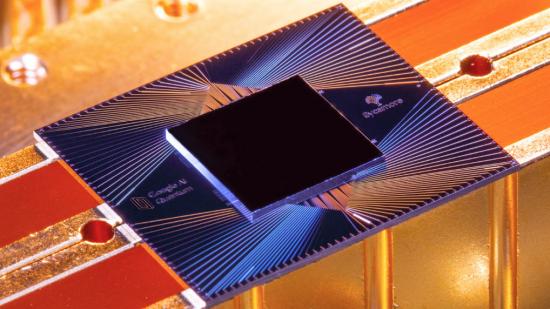Bitcoin’s recent midweek plummet has been widely attributed to Google’s recent quantum computing breakthrough. Claiming quantum supremacy – the moment when a quantum computer can operate faster than a classical one – Google’s Sycamore chip has raised questions regarding whether crypto will be secure and viable in a post-binary world.
While quantum computing doesn’t currently pose any threat to the fundamental cryptographic foundations of cryptocurrencies as they stand today, the efficiency in which qubits can chomp through algorithms – a matter of minutes in comparison to the millennia required for today’s binary processors – has caused ripples in Bitcoin’s pricing, and felt throughout the entire cryptocurrency market.
Google’s Sycamore quantum chip was published in Nature on October 23, 2019 following its accidental publication earlier this month on the NASA website. That’s also the same day that Bitcoin crashed a little under 7% to £5,780 (via Coinbase), a shift attributed to the potential for quantum computing to one day render encryption algorithms at the core of Bitcoin and other blockchain applications (such as SHA-256) irrelevant (via Notebook Check). This is also a wider concern for digital security as a whole.
But Bitcoin’s value has since mustered and returned to £7,319 at time of writing. That’s quite a rally for the cryptocurrency, and puts it back on track. The crypto, which acts as a baseline for many others, has been on a gradual uphill trajectory for the since the beginning of 2019, although is still some distance from the highs of nearly £15,000 enjoyed at the end of 2017.
That’s perhaps due to some of miners’ concerns being quelled – at least temporarily. Quantum, by its very nature, is extremely well-suited to solving algorithms at unrivalved pace. It relies on qubits, the basis of quantum computing which can exist in both 1, 0, and both simultaneously known as a superposition. This allows quantum machines to calculate at a pace unheard of in the classical computing world.
But quantum machines are also notoriously difficult to build, even harder to operate, and are often wrong due quantum noise. To stay quantum noise propogating inaccuracies, these machines have to be built with error-checking, which would see the number of qubits required for near-perfect operation increase exponentially to a million or more. Google’s Sycamore chip has 54 qubits, of which 53 were operational.
And so crypto remains safe for the time being. While quantum supremacy may have been achieved in the lab, and that’s a spectacular achievement in itself, there’s still a long road ahead before it truly becomes a game-changing alternative to classical machines. And perhaps by then, encryption and cryptography will be up to the challenge.
